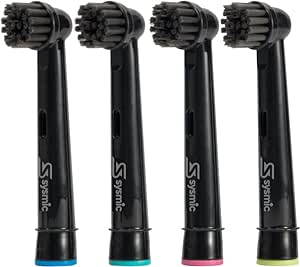So, you’ve heard people raving about using activated charcoal to whiten teeth and a whole load of other things. But does charcoal teeth whitening powder really work, and how are you supposed to use it?
In the quest to make your teeth whiter, probably the last thing you’d think of is covering them in a black powder. Still, some people swear by this treatment as a natural way to get whiter teeth – and there’s a good scientific reason why it does work.
Keep reading to find out what’s so special about this type of charcoal and the different ways you can use it in your oral hygiene routine. We have also researched some of the best activated charcoal teeth whitening products available in the UK to take the confusion out of buying this at-home natural teeth whitener.
Best Activated Charcoal for Teeth Whitening | ||
MySmile Active Charcoal Teeth Whitening Powder |
| |
Eclat Activated Charcoal Tooth Powder  |
| |
Pro Teeth Whitening Co Activated Charcoal Natural Teeth Whitening  |
| |
Laila London – Activated Charcoal Tooth Whitening Powder 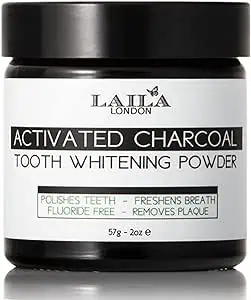 |
| |
Janina Ultra White Activated Charcoal Whitening Toothpaste  |
| |
Oral-B Toothbrush Heads Charcoal Infused Bristles From LiveCoco  |
| |
Procoal Activated Charcoal Teeth Whitening Powder  |
| |
In This Article
- 1 How does charcoal whiten teeth?
- 2 Using activated charcoal for teeth whitening
- 3 Best activated charcoal powder in the UK
- 4 Activated charcoal toothpaste
- 5 Charcoal teeth whitening toothbrushes
- 6 Charcoal dental floss
- 7 Whitening strips with activated charcoal
- 8 Activated charcoal teeth whitening products comparison
- 9 Conclusion
How does charcoal whiten teeth?
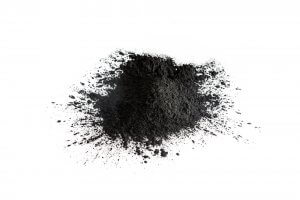
Inside your body, activated charcoal can whisk chemicals and toxins out of your system. For teeth, it encourages plaque, bacteria and other particles to cling to it so they are all rinsed off together. Let’s look at exactly what activated charcoal is and the properties that make it so special.
What is activated charcoal?
First, this is NOT the same stuff that’s left over after a bonfire or available in art shops. Activated charcoal (also called activated carbon) has special properties because of the way it is produced. The activation process involves subjecting the charcoal to very high temperatures, either chemically or with steam. This creates tiny, low-volume pores throughout the material which give it a huge surface area.
Here you can the steps involved with making activated carbon from coconut shells:
Amazingly, just one gram of activated carbon has the surface area of more than 11 tennis courts, thanks to its complex structure.
This surface area lets the charcoal adsorb large amounts of other substances (meaning they stick to the surface of it).
Note that teeth-whitening charcoal can only remove stains from the surface of your teeth. These are often caused by deep coloured foods and drinks, including:
- tea
- coffee
- red wine
- tomato sauces
- curries
So, does charcoal really whiten teeth? Yes, it does, as long as it’s activated charcoal. But, charcoal in any form won’t make your teeth whiter than they naturally are. If you have naturally yellow teeth or they have become discoloured because of medication or a health condition, you’ll need to try another form of whitening.
Is activated charcoal safe for teeth?
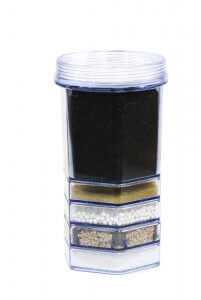
It’s completely safe to ingest small amounts of activated charcoal. It is commonly used to treat cases of poisoning as it is so good at absorbing toxins before they enter the blood stream. It also features on the World Health Organisation’s list of essential medicines, so there should be no question over its safety.
Activated carbon is also used in a number of everyday products and processes such as water filters and the decaffeination of coffee. You probably make use of it every day without even realising.
When it comes to using activated charcoal on teeth, some concerns have been raised about its abrasive nature. Charcoal is effective at removing surface stains on teeth, but there is also a risk it will erode enamel, too. Our tooth enamel can’t replenish itself, so it’s not a good idea to keep scratching away at it.
As tooth enamel thins, the yellower inner layer of dentin starts to show through. So ironically, teeth whitening with an abrasive method can eventually lead to teeth become yellower.
Dentists warn against overuse of whitening toothpastes for the same reason. But whereas traditional whitening toothpastes rely on brushing to be effective, charcoal pastes can “pull” some stains from the surface without brushing.
Precautions
If you’re worried about charcoal damaging your tooth enamel, you can always just apply a paste to your teeth and leave it for a few minutes. Then rinse, and brush as normal with your regular toothpaste if you like. Alternatively, use an activated charcoal toothpaste to brush just a few times a week.
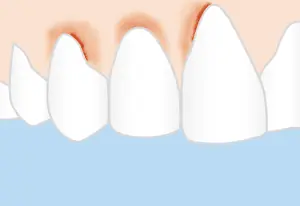
If you notice your gums becoming sore, switch back to your normal toothpaste for a while until they have recovered. Then you can resume brushing with charcoal, but perhaps do it less often.
Activated charcoal toothpaste generally doesn’t contain added fluoride. Some people see this as a benefit as they want to avoid additives. But in actual fact, fluoride is added to most commercial toothpastes because it is effective at strengthening teeth and fighting tooth decay. This is another good reason to alternate your charcoal toothpaste with a regular one.
You shouldn’t brush with charcoal if you have any open wounds or mouth ulcers. If in doubt, speak to your dentist for a medical opinion. Also check with your dentist before use if you have any teeth implants, veneers or dental crowns. The materials used in these may be less resistant to staining from charcoal.
It’s not safe to inhale the powder, so do be careful when you use it at home.
Using activated charcoal for teeth whitening
We’ve already established that you can’t just pick up a bag of charcoal from your local petrol station and start rubbing it on your teeth. You need to use medically safe activated charcoal for teeth whitening. You can buy this in several different forms from health food shops and online.
These include:
- Powders (both loose and in capsule form)
- Tablets
- Toothpaste
- Whitening strips
Activated charcoal tablets are primarily intended for ingestion to treat internal problems. You can, in theory, grind them up and add water to form a paste – but there are much less time-consuming ways to get the same result. If you don’t want to deal with tubs of loose charcoal powder, capsules are a good alternative.
Here is a guide to of some of the best charcoal teeth whitening products available, how to use them, and how effective they are:
Best activated charcoal powder in the UK
Activated charcoal powder for teeth comes in tins or jars of 60-80g which should last for several months. The fine powder can be mixed with water or other ingredients for brushing (more on this below). You can buy it raw – just charcoal powder – or as a pre-mixed powder which contains other ingredients to help with whitening, breath freshness, and so on.
SmileTime Natural Charcoal Teeth Whitening Powder
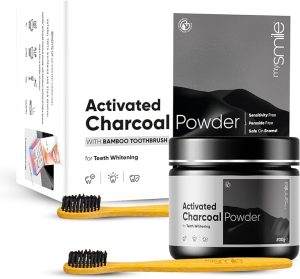
Our top pick for activated charcoal whitening powder comes from MySmile.
Their Natural Charcoal Teeth Whitening Powder is an advanced EU formula which safely removes surface stains leaving you with a whiter smile.
The ingredient list includes natural activated charcoal, coconut oil and sodium bicarbonate to help remove cavity-causing bacteria while also reducing plaque build-up on the teeth.
This whitening powder is completely free of all harmful chemicals and has no side effects, unlike other products on the market. It is safe to use for short periods of time and is designed for sensitive teeth and gums. It even helps reduce bad breath as part of its all-natural formula and has a fresh minty taste. It also comes with two 100% biodegradable handmade bamboo toothbrushes.
You’ll notice a whiter smile and reduced sensitivity after just one use! No chemicals. Just a better-looking, longer-lasting smile!
Procoal activated charcoal teeth whitening powder
Procoal London activated charcoal powder is a completely natural teeth whitener. Its non-abrasive formula helps remove surface stains gently, without harming your tooth enamel. The raw charcoal itself is pretty much tasteless – it leaves no bad taste in your mouth as some people might expect.

It’s made in the UK, 100% vegan, and the 60ml jar should last 5-6 months.
Procoal activated charcoal reviews suggest people are pleasantly surprised with the quick results. “I was somewhat sceptical about this but it actually seems to work from the first use – teeth instantly seem whiter than after years of using so called “whitening” toothpaste with next to no results.” says one.
Using a raw charcoal powder like this on your teeth is inherently messy, but if you wet your toothbrush and then dip it in the powder as directed then it shouldn’t end up everywhere. You might just want to brush your teeth before doing your makeup – not after.
“I had coffee and nicotine stains on my front teeth and after 10 days use they’re gone.” says another, adding that it took a little while to get used to using it.
Eclat pure activated charcoal tooth powder
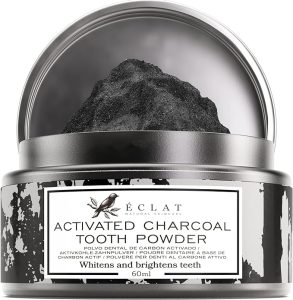
If you’re worried about the abrasiveness of activated charcoal, this powder from Eclat may be the answer. Their activated charcoal powder is backed by a ton of science and includes patented steam activation technology which helps it adsorb five times more stains than other varieties.
You can read their product page for full details of all the science behind the product. But perhaps the most important thing to note is that whereas raw charcoal powders usually have an RDA (Relative Dentin Abrasivity) score of around 225, Eclat has an RDA of just 30. The legal maximum is 250, so that’s quite a difference.
What this means in practice is that you can use this activated charcoal powder for teeth whitening, with less worry about it damaging your enamel.
To top it all off, Eclat offer a money-back guarantee for anyone not happy with this product.
Laila London activated charcoal tooth whitening powder

Another popular product with a different composition is Laila London Tooth Whitening Powder. This charcoal powder contains 100% natural and organic ingredients, including calcium carbonate which helps with tooth sensitivity and aids in re-building enamel.
It’s flavoured with peppermint, lemon, cinnamon and cloves, so has a slightly spicy taste. These ingredients also help keep bacteria levels low in your mouth.
Reviews of Laila London activated charcoal report generally good results, and many comment on how clean their teeth feel after using the powder. A few, though, dislike the gritty texture and worry about it damaging their teeth and gums.
How to brush teeth with activated charcoal powder
Here is a step-by-step guide to brushing teeth with charcoal powder:
- Hold your toothbrush under running water to clean it and get all the bristles wet.
- Tap or shake it so the bristles are damp but are not holding any excess water.
- Hold your tin of charcoal powder over the sink and also lean over so your mouth is over the sink (this is so that any spills are easy to clean up).
- Dip your toothbrush about a quarter of the way into the powder (you only need a little).
- Lightly brush your teeth for the time stated on the product packaging.
- Don’t be put off by your scary black mouth.
- Rinse thoroughly by brushing with water.
Alternatively, you can mix a small amount of teeth whitening powder and water together in a container to form a paste.
Brushing charcoal into your teeth can damage them if you don’t use a soft enough toothbrush. That’s why some dentists recommend using your finger rather than a brush, and only using activated charcoal for teeth occasionally.
The best use for activated charcoal is for maintaining the whiteness of tooth whitening treatments provided by your dentist. You can buy activated charcoal pellets from a health food store and crush them with a mortar and pestle, or use a few teaspoons of powder. Add a tiny bit of water and stir. Add more water (a little at a time) until you end up with the consistency of toothpaste.
Here’s the important part: Use only your finger to gently rub the paste on your teeth. Then rinse your mouth with water, swish it around then spit it out — no swallowing! Store any leftover paste in an airtight container in the fridge.
Do Not:
- Put activated charcoal toothpaste on a brush
- Let the activated charcoal get rubbed into your gums
Remember, activated charcoal is very abrasive, a little bit goes a long way. Think of it as something to use weekly, not every single day.
Dr. Nammy Patel, Green Dentistry, SF
A word of warning: although charcoal removes stains from your teeth, it will itself stain a lot of other things. Keep the powder away from things like clothing, carpets and tile grouting.
You can also buy powdered charcoal in individual capsules, suitable for ingestion. It’s possible to break one or two of these open to access the powder for brushing, as the girl in the video did. Some people find this less messy than using a tin, while others have problems with the powder going everywhere when they open the capsule.
If you’d like to try this method, these activated charcoal capsules from Nu U Nutrition are a good choice. They’re manufactured in the UK and made with a vegan formula. If you want to experience the other benefits of activated charcoal by taking it orally as well as brushing your teeth with it, these capsules are suitable for both jobs.
Activated charcoal toothpaste
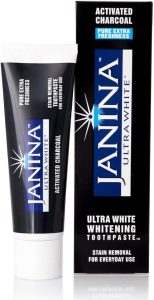
If you use a pre-mixed charcoal teeth whitening toothpaste, the whole process becomes much less messy. You simply apply it to your toothbrush as you would with your regular toothpaste. Some people also prefer a toothpaste because of the familiar taste and texture.
Janina Ultra White Activated Charcoal Toothpaste is one such product which is popular in the UK. Its activated charcoal formula works on eliminating bad breath as well as stains from smoking and drinking coffee. It contains fluoride to protect against cavities, too.
The manufacturers recommend using it twice a day for at least three minutes at a time. Several reviewers stress the importance of following these instructions if you want to see results. However, another user who experienced sensitivity said she dropped down to using it once a day, alternating with a regular sensitive toothpaste. She said the product has still “definitely made a good difference”.
There are some complaints about the taste being strong and chemically, but overall people seem pleased with their results. Its also designed for minimal abrasiveness on teeth.
Pro Teeth Whitening Co, whose activated charcoal powder we featured above, also make a charcoal toothpaste which contains 100% natural ingredients. It doesn’t contain fluoride, making it a good choice for people who prefer a non-fluoride activated charcoal toothpaste.

“I am genuinely surprised at just how good this toothpaste is. It has definitely whitened my teeth a little but it’s how clean and fresh you feel afterwards that’s the best bit. My teeth are literally squeaky clean and it lasts all day,” says one happy reviewer.
For more information about toothpaste with charcoal, you can read our full guide here.
Homemade charcoal toothpaste
If you want the convenience of a toothpaste but prefer to make it yourself, you can buy powdered activated charcoal and mix your own charcoal toothpaste in batches.
You can form a thick paste with the powder and water, but some people prefer to use coconut oil because of its anti-bacterial properties. Store the paste in a small tin or airtight container for a week or two.
There are other ingredients you can use to make a natural homemade toothpaste, such as bicarbonate of soda and bentonite clay. Check out some more homemade toothpaste recipes or read about other natural oral care products.
It is also possible to use these ingredients to make homemade mouthwash for whitening teeth. If you want to check out more natural mouthwash recipes our guide has several.
Charcoal teeth whitening toothbrushes
Charcoal toothbrushes are not actually made from the mineral itself, but the bristles are infused with it. The brush, therefore, takes on some of the adsorption properties to pull bacteria and plaque from your teeth.
There is no scientific evidence to show that these toothbrushes are more effective at cleaning and whitening, especially over time. Still, there is certainly no harm in using one to supplement your activated charcoal toothpaste or powder.
Many varieties come in the form of an eco-friendly, biodegradable bamboo toothbrush, but plastic handles are also available. You can even get a charcoal fibre toothbrush head to fit an Oral-B electric toothbrush!
Charcoal dental floss
Did you know you can even get dental floss infused with charcoal? It’s unlikely to have much of a whitening effect, but plastic-free bamboo charcoal floss is certainly better for the environment than the mass-produced brands you might be used to.
Check out our biodegradable dental floss guide to read more about the different options if you want a more eco-friendly dental care routine.
Whitening strips with activated charcoal
Another way to use activated charcoal to whiten teeth is with whitening strips. They are not the most effective way to whiten teeth but they do have their place.

Whereas traditional whitening strips contain peroxide, some varieties use the stain-removing properties of charcoal. This makes them a gentler way to achieve results, especially if you have sensitive teeth.
Our top pick for charcoal teeth whitening strips comes from a brand that should be familiar by now… Pro Teeth Whitening Co! There are others available, but these guys just seem to do a good job of making activated charcoal dental products.
These strips contain all-natural ingredients and are formulated by dentists to be safe for teeth.
Use them for 30 minutes daily and brush your teeth straight afterwards for best results. The pack includes 28 strips, so enough for 14 days of treatment.
Reviews are mixed, with some people reporting a difference after the first use but others ending up disappointed. However, if you like the idea of charcoal teeth whitening but don’t want to deal with messy powder or potentially damaging toothpaste, you could certainly give these a try.
Activated charcoal teeth whitening products comparison
Below you’ll find a table to summarise and compare all the products we’ve discussed in this article.
Raw powder | Powder blend | Toothpaste | Whitening strips | |
Recommended brand | ||||
Unit size | 60ml | 60ml | 75ml | 14 sets |
Pros | No taste; pure charcoal powder; low abrasivity | Good results; reasonable taste; all natural | Freshens breath, low abrasivity | Good for quick results |
Cons | Messy/difficult to use | Messy/difficult to use | May cause sensitivity, some complaints about taste | Not long-lasting, messy to clean off |
Conclusion
There are many options if you want to try activated charcoal teeth whitening to improve your smile. Black charcoal powder seems to give the best results, judging by reviews. However, applying charcoal teeth whitening powder directly to teeth can be very messy. You might decide to make your own charcoal powder toothpaste or buy one pre-made. Alternatively, charcoal whitening strips can be effective at giving teeth a brighter shade.
There are benefits and drawbacks to each of these products, so check reviews and experiment to see what works best for you. Take a cautious approach when using activated charcoal on teeth since it can be abrasive and may cause damage to teeth and gums if used to often or too vigorously.
If you’re interested in other natural products that could provide teeth-whitening benefits despite their obvious non-white hue, read our article that answers the question, ‘does turmeric stain your teeth?‘
Keep in mind that the only way to get your teeth whiter than their natural shade is with tooth bleaching. This needn’t be expensive though – many home whitening kits produce good results.
Above all, remember that the best way to keep your teeth clean and healthy is to visit your dentist and hygienist regularly. If you have any underlying oral health issues, any whitening treatment may aggravate them and cause pain or sensitivity.







